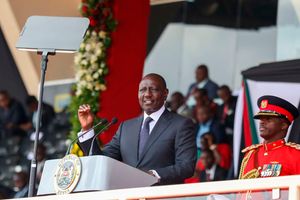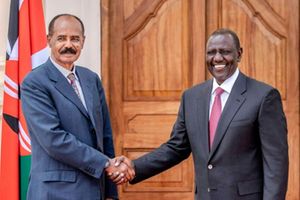Premium
Young MPs and EU working to create safe spaces for youth

Nairobi Senator Johnson Sakaja and Embakasi East MP Babu Owino addressing journalists after a meeting between Kenya Young Parliamentarians Association and university student leaders at St Andrews PCEA Church in Nairobi on July 10, 2018. PHOTO | DENNIS ONSONGO | NATION MEDIA GROUP
What you need to know:
- Young legislators in the Parliament have been creating safe civic spaces for youth under the auspices of the Kenya Young Parliamentarians Association.
- At last year's EU-African Union Summit in Abidjan, African and EU leaders focused on investing in youth.
- The European Union's greatest relevance to youth is through the jobs that are created by trade and investment relations between Kenya and Europe.
The United Nations General Assembly in 1999 declared International Youth Day as a day when youth around the globe are celebrated.
The annual event, marked globally on 12th August, not only celebrates the innovation and energy of youth but also provides an opportunity for governments and other stakeholders to focus on youth policies.
The theme for this year's celebrations is ‘Safe Spaces for Youth’. These safe spaces are needed to ensure the dignity and safety of youth to engage in activities related to their diverse needs and interests, participate in decision making processes, and freely express themselves.
Political instability, labour market challenges and limited space for political and civic participation have led to increasing isolation of youth in societies, from which Kenya is not exempt.
DEMOCRATIC PROCESSES
For instance, young Kenyans’ participation in democratic processes is often limited to pre-election campaigning, voting, and post-election agitation, which often leads to violence in the short run, and to poverty, disruption of education, unemployment, and disenfranchisement in the long run.
Kenya's youth thus need safe spaces to, among other things, access proper healthcare and education, engage in productive employment and in the democratic processes, and access safe public spaces to enable them to interact in society.
Young legislators in the Parliament have been creating safe civic spaces for youth under the auspices of the Kenya Young Parliamentarians Association (KYPA).
Whereas more needs to be done, the association has provided a platform not only for youth to meaningfully engage with the legislature, but also for young members of county assemblies to be able to caucus both nationally and within their counties to replicate KYPA’s work at the county level.
MARGINALISED POLITICALLY
Youth are the majority of Kenyan voters, but rarely do they have their say in the state of affairs in this country.
Despite being a majority, they have always been marginalised politically, economically, and socially.
So, for the youth of Kenya, the Building Bridges Initiative should be not only an event but the first step that will provide impetus for more meaningful youth engagement and representation in the political process, helping to redress the demographic deficit in policy-making that is the reality in Kenya and indeed throughout the world.
For its part, the European Union recognises the need for widespread action in support of youth, both in Europe and in Africa.
BETTER OPPORTUNITIES
In recent years EU leaders have been increasingly committed to creating better opportunities for youth in Europe, for instance in the work towards a European Education Area. Meanwhile, at last year's EU-African Union Summit in Abidjan, African and EU leaders focused on investing in youth.
This is a key priority for Africa and the European Union as 60 per cent of Africa's population is under the age of 25.
Addressing youth at the EU-African Union Summit, EU President Donald Tusk said: “You rightly expect that we listen to you as we discuss priorities and actions for the next years, and that we include you in their implementation, because it is you who will take them forward in the future. Our task as leaders is to take decisions that will make the future safer and more prosperous for all of our youth, both African and European.”
Here in Kenya, the European Union's greatest relevance to youth is through the jobs that are created by trade and investment relations between Kenya and Europe.
FOREIGN INVESTMENT
The European Union is the biggest market for Kenya's exports, and is also the leading source of foreign investment in Kenya's economy.
The European Union is also an important source of funding to support regional security in eastern Africa, of financial support for Kenya's development, of aid to alleviate humanitarian crises that affect the country and its neighbours, and of financial support for Kenyan students seeking to study in Europe.
Practically all such financial support from the European Union brings some economic and social benefits to Kenya's youth, even if their effects are only indirect.
But, perhaps just as importantly as its economic and social roles, the European Union has political and cultural values that appeal to many of Kenya’s youth.
The European Union isn’t trying to impose these values on Kenya and its people, but rather to build on the choices that they make for themselves.
FUNDAMENTAL RIGHTS
Indeed the values contained in Kenya's Constitution match the European Union's global commitments to promoting democracy, the rule of law, and respect for fundamental rights.
The European Union also has a wealth of political experience — both good and not-so-good! — that can help inform Kenya's youth about some of the political challenges facing the country, such as devolution and political inclusivity.
Against that background, young legislators, with encouragement from the European Union, have begun to work together to spearhead youth's contribution to the Building Bridges Initiative, whose objective is ensure true reconciliation and sustainable coexistence of communities in Kenya with the youth in focus.
This engagement is imperative for Kenya's youth because they are custodians of the future that the Building Bridges Initiative seeks to create in this country.
Johnson Sakaja is the Senator for Nairobi County while Stefano A. Dejak is the European Union Ambassador to Kenya.






